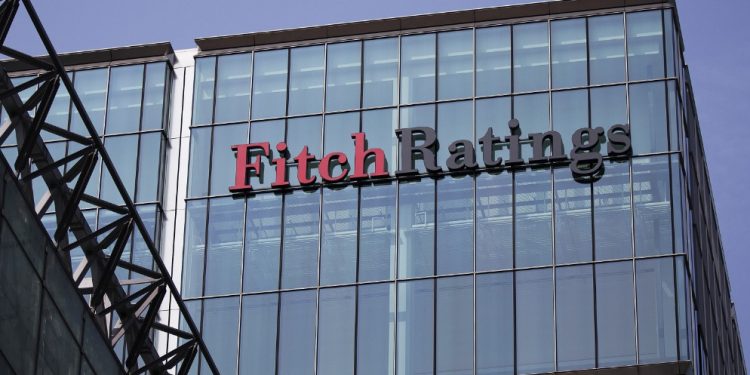Fitch Ratings has upgraded Ghana’s Long-Term Foreign-Currency Issuer Default Rating (IDR) from ‘Restricted Default’ (RD) to ‘B-’, assigning a Stable Outlook. This marks a significant step in the country’s return to global capital markets and reflects progress in debt restructuring and macroeconomic stability.
Key Drivers of the Upgrade
1. Normalization with Creditors:
Ghana has successfully restructured $13.1 billion in Eurobonds as of October 2024. Only $2.6 billion in external debt remains to be restructured, of which just $700 million (5% of the original commercial debt targeted) is considered commercial. Fitch views the risk of creditor holdouts as low, with negotiations ongoing.
2. Near Completion of Debt Restructuring:
In January 2025, Ghana ratified a memorandum of understanding covering $5.1 billion in bilateral official debt. Of the outstanding $2.6 billion:
- $1 billion is owed to supranational entities
- $840 million to official creditors
Fitch expects full restructuring to conclude by end-2025.Also Read: Power struggle hits NPP: General Secretary Justin Kodua fingered in plots to oust Vice Chairman
3. Fiscal Performance and Outlook:
Ghana’s fiscal deficit widened in 2024 (primary deficit of 3.9% of GDP) due to election-related spending. The new administration targets a primary surplus of 1.5% of GDP in 2025, mainly through expenditure cuts. Fitch forecasts:
- Primary surplus of 0.5% in 2025 and 0.9% in 2026
- Overall deficit of 3.6% in 2025 and 3.2% in 2026 (down from 7.9% in 2024)
4. Manageable Debt Service Obligations:
- Foreign-currency debt service projected at 1.2% of GDP in 2025 and 1.4% in 2026
- Interest payments: 0.5% of GDP in 2025, 0.4% in 2026
Reserves rebounded to $6.8 billion in 2024 and are expected to grow further, supporting Ghana’s external debt servicing capacity.
Local-currency debt service (excluding T-bill refinancing) is forecast at:
- 3.8% of GDP in 2025
- 3.9% in 2026
T-bond principal payments will rise to 2.2% of GDP in 2027 as DDEP bonds mature. Market reopening and falling inflation are expected to normalize the domestic debt environment.
5. Liquidity and Interest Burden:
- Interest/revenue ratio stable at ~26% in 2025–2026, down from 48% in 2021
- Weighted average coupon on DDEP bonds rises from 5.4% in 2024 to 9.1% in 2025
Despite improvements, Ghana’s interest burden remains above peer medians (‘B’ median: 13%).
6. Debt Decline Supported by Exchange Rate Gains:
Public debt is projected to decline to 60% of GDP in 2025–2026, down from 72% in 2024 and a peak of 93% in 2022. This is driven by:
- Strong nominal GDP growth
- Fiscal consolidation
- Cedi appreciation
Compared to a ‘B’ median of 51% in 2026.
7. External Balances and Reserve Accumulation:
- Current account surplus (CAS) to fall from 4.3% of GDP in 2024 to 1.1% in 2026 due to rising imports and falling export prices
- Reserve coverage to rise to 3.9 months of imports in 2026, up from 2.6 months in 2024
8. Disinflation and Monetary Policy:
Inflation is projected to fall from 23% in 2024 to:
- 15% in 2025
- 10% in 2026
Driven by currency appreciation, tighter monetary policy, and lower global oil and food prices. Policy rate cuts are expected from July 2025.
9. Resilient Economic Growth:
Real GDP growth remains strong, despite restructuring:
- 3.1% in 2023
- 5.7% in 2024
- 4.0% forecast for 2025
- 4.5% in 2026
Recovery in agriculture and expansion in services and industry underpin growth.
ESG Considerations
Governance (ESG Score: 5):
Political Stability, Rule of Law, Institutional Quality, and Control of Corruption are key constraints. Ghana ranks around the 50th percentile on World Bank Governance Indicators (WBGI).
Human Rights and Freedoms (ESG Score: 4+):
Ghana’s strong performance in Voice and Accountability positively impacts its credit profile.
Creditor Rights (ESG Score: 4):
Ghana’s 2025 debt restructuring negatively impacts its credit score in this category.
Rating Sensitivities
Factors That Could Trigger a Downgrade:
- Renewed liquidity pressures or fiscal slippage
- Inability to refinance domestic debt or reopen bond markets
- Declining international reserves or widening current account deficits
Factors That Could Trigger an Upgrade:
- Sustained reduction in debt-to-GDP, supported by credible fiscal policy
- Lower liquidity risks due to reform credibility and stable macro conditions
- Stronger reserve accumulation approaching peer medians
Sovereign Rating Methodology
Fitch’s Sovereign Rating Model (SRM) assigned Ghana a ‘B-’ rating based on 18 macro-financial variables. No adjustments were made by the rating committee to this output.
Country Ceiling: ‘B-’
Reflects no material barriers to currency conversion or transfer for debt payments.
This upgrade signals cautious optimism from international markets, reflecting Ghana’s improving macroeconomic fundamentals, but also highlights the continued need for credible reforms and sustained fiscal discipline.


